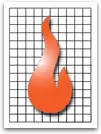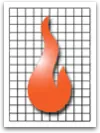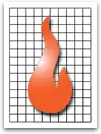Thermocouple Manufacturer
Use the links below to explore our wide range of thermocouples, or contact us to learn how EUSTIS/Pyrocom can be your one-stop supplier for all your industrial thermocouple needs. With fast order turnaround and competitive pricing, EUSTIS/Pyrocom is your source for thermocouples.
Types of Thermocouples at Eustis/Pyrocom
Eustis/Pyrocom manufactures and distributes reliable thermocouples for virtually any industrial application. From metal, glass, and plastic processing facilities to oil refineries and power generation plants, industrial customers rely on EUSTIS/Pyrocom's thermocouples for reliable temperature measurement. Styles of thermocouples we manufacture include:- Wire Thermocouples: Wire thermocouples are a low-cost solution to temperature measurement in ranges below 900°F and are available in various covering options.
- Mineral Insulated Thermocouples: Mineral insulated thermocouples feature higher durability and sturdy construction. They encapsulate a matched pair of thermocouple elements inside a stainless steel or nickel-based alloy sheath. The metal sheath material is more durable than wire coverings.
- Industrial Thermocouple Assemblies: Industrial thermocouple assemblies are designed to mate with a thermowell, pipe well, or ceramic tube. Assemblies typically include nipples and pipe unions and are mated with connection heads, protecting the sensor from dirt and moisture.
ASTM Thermocouple Alloy Combinations by Letter Type
Thermocouples are classified into different types based on the metals used in their wires, capacity, and calibration. Base metals are used in Types E, J, K, N, and T thermocouples, while noble metals are used in Types C, R, and S. The calibration of a thermocouple is established based on the combination of the metal used, the desired temperature range, and the influence of external environmental factors. Wires with larger diameters are more effective in utilizing the optimal temperature range. When selecting a thermocouple, it is essential to consider its temperature range and resistance to chemicals, vibration, and abrasion.Type J - Iron (+) Constantan (-)
Type J, Iron (+) Constantan (-) is the most commonly used calibration. It is suitable for vacuum, inert, oxidizing, or reducing atmospheres. If unprotected, ammonia, nitrogen, and hydrogen atmospheres may attack the iron wire. Iron & Constantan wires can generate galvanic EMF between the two wires and should not be used in applications where they might get wet. The positive leg is magnetic.Type T - Copper (+) Constantan (-)
Type T - Copper (+) Constantan (-) is commonly used for subzero to 700°F temperatures and preferred to Type J for subzero applications because of copper's higher moisture resistance than iron. It will still function in a vacuum, inert, oxidizing, or reducing atmospheres if unprotected. Copper-Constantan thermocouples are susceptible to conduction error due to the high thermal conductivity of the copper. Neither leg is magnetic.Type K - Nickel-Chromium (+) vs. Nickel-Aluminum (-)
Type K- Nickel-Chromium (+) vs. Nickel-Aluminum (-) is generally used to measure high temperatures to 2300°F (1261°C). It should not be used for accurate temperature measurements below 900°F (482°C) or after prolonged exposure above 1,400°F (760°C). It can be used only in inert or oxidizing atmospheres if left unprotected. It has a short life in alternately oxidizing and reducing atmospheres, particularly in the 1,500°F (816°C) to 1850°F (1010°C) range. The negative leg is magnetic.Type E - Nickel-Chromium (+) vs. Constantan (-)
Type E- Nickel-Chromium (+) vs. Constantan (-) has the highest EMF output of any standardized metallic thermocouple. If used unprotected, type E wire is not subject to corrosion at subzero temperatures. Type E can be used in inert, oxidizing or reducing atmospheres. Because they cover a wide range with a single calibration curve, type E thermocouples are preferred for computer applications.Type N - Nicrosil (+) vs. Nisil (-)
Type N- Nicrosil (+) vs. Nisil (-) Superior oxidation resistance over type K due to the combination of a higher level of chromium and silicon in the N (+) (Nicrosil alloy) conductor. Similarly, a higher level of both silicon and magnesium forms a diffusion barrier to protect the N (-) (Nisil alloy). Because of increased stability, it is recommended in nuclear applications.Type R - Platinum -13% Rhodium (+) vs. 100% Platinum (-)
Type R - Platinum - 13% Rhodium (+) vs. 100 % Platinum (-), These thermo elements should always be protected from contamination by reducing oxides, metallic vapors, or other oxides at high temperatures. Insulation should be silica free to prevent contamination. Type S is frequently used for calibration standards. Type R is slightly more sensitive and commonly used in industrial applications.Type B - Platinum - 30% Rhodium (+) vs.Platinum - 6% Rhodium (-)
Type B- Platinum - 30% Rhodium (+) vs.Platinum - 6% Rhodium (-). For use between 1000° and 3,175°F. It is intended to prevent the problems experienced with types S and R, such as (1) weakening of the pure platinum leg due to excessive grain growth and (2) calibration shift due to the pure platinum wire picking up rhodium volatilized from the alloy wire at 2,732°F. The flatness of the temperature-millivolt curve at normal reference junction ambient temperature permits the use of copper extension wire.Type C - Tungsten - 5% Rhenium (+) vs. Tungsten - 26% Rhenium - (-)
Type C - Tungsten - 5% Rhenium (+) vs. Tungsten - 26% Rhenium - (-) thermo elements have excellent stability in the 3,000 to 4,000°F range. A protective atmosphere must be used at high temperatures, such as hydrogen, inert gas, or vacuum. They are susceptible to mechanical damage and should be handled carefully to prevent breakage.Eustis/Pyrocom is Your Trusted Thermocouple Manufacturer
Located north of Seattle in Lynnwood, Washington, EUSTIS/Pyrocom has manufactured high-quality thermocouples since 1962. Our expertise as a custom RTD and thermocouple manufacturer allows us to offer a diverse range of products for industrial applications, including thermocouple fittings, wire and cable, protection tubes, and more. Our accredited temperature calibration laboratory provides calibration services for RTDs and thermocouples. At EUSTIS/Pyrocom, we are committed to ensuring the highest quality standards in all our thermocouple products and services.Contact Us for Premium Flexible Thermocouples, Fittings, & Connectors
Contact us to learn more about the thermocouples we distribute. You can also request a quote for additional pricing information on our wire thermocouples, mineral-insulated thermocouples, and industrial thermocouples. EUSTIS/Pyrocom is your trusted source for reliable thermocouples for industrial applications.*Teflon is a trademark of E. I. du Pont de Nemours and Company or its affiliates






